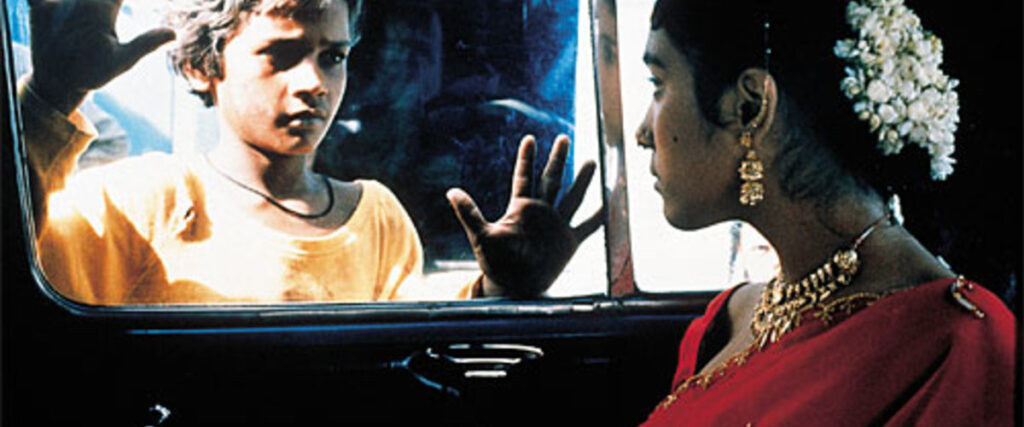Each day during this special week we will be highlighting the filmmakers and actors that Roger championed throughout his career. A table of contents for all of our “Roger’s Favorites” posts can be found here. Below is an entry on director Mira Nair.
Born in India and educated at both Delhi University and Harvard, New York-based filmmaker Mira Nair has made a career of presenting audiences (especially American viewers) with characters they may not know first-hand, but connect with personally. Whether in her directorial debut and international breakthrough “Salaam Bombay!” (Oscar-nominated for Best Foreign Language Film in 1989) or family tales “Mississippi Masala” or “The Namesake,” the writer/director/producer has constructed a unique authorship that Roger often enthusiastically responded to in his reviews. A fan of hers since giving four stars to “Salaam Bombay!”, and never shy to call out any falsities in her work, there’s a constant air of support in Roger’s takes on her films. He was always excited about how she used cinematic beings of specific backgrounds to find truths of universal experience. Nair’s next film will be September 2016’s “Queen of Katwe,” about a Ugandan chess player, featuring the on-screen talents of Lupita Nyong'o and David Oyelowo.
After making a few documentaries, Nair’s first feature “Salaam Bombay!” highly impressed Roger, as felt in his review published on October 28, 1988. He admired the way that Nair implemented pieces of reality for such a striking feature narrative: “Using [young lead actor Shafiq Syed] and shooting on actual locations in Bombay, director Mira Nair has been able to make a film that has the everyday, unforced reality of documentary, and yet the emotional power of great drama.” He followed that statement up with a clear-cut announcement that “Salaam Bombay!” was one of the best films of 1988.
The success of “Salaam Bombay!” brought Nair to bigger projects, stories that brought different images of American families to wide audiences. On February 14, 1992, Roger gave three-and-a-half stars to her second film, “Mississippi Masala,” as it presented an Indian woman (Sarita Choudhury) falling in love with an African-American man (Denzel Washington) in the state of Mississippi. While Roger thought that “Nair tries to cover too much ground” with a plot that’s “really three movies,” Nair’s new perspective excited the critic: “And yet I do not complain too much, because ‘Mississippi Masala’ has the benefit of showing me people I had not met before.”
Her next film, “The Perez Family,” was another story that expressed her “special interest in new arrivals to America.” Roger gave the film three stars in a review published on May 12, 1995. A tale about Cuban immigrants nonetheless performed by Anjelica Huston, Alfred Molina and Marisa Tomei, “The Perez Family” caused Roger to take a stance on casting non-Hispanic actors for Hispanic roles: “Maybe nontraditional casting is a two-way street; what’s certain is that the actors bring real heart to their roles.” The casting must have worked well enough for Roger, as while he thought “the movie relies little too much on contrivance sometimes,” he remained a fan of Nair’s efforts: “The movie sometimes bends the plausible to set up a laugh, and most of the time I didn’t care, because I was enjoying the company of the characters.”
Roger was startled by her next film “Kama Sutra: A Tale of Love,” which he gave the lowest rating for a Nair film yet of two stars in a review published on March 7, 1997. He wrote: “the movie’s story is really just the occasion for the scenes of eroticism, but it must be said that those scenes have a beauty and solemnity that is quietly impressive.” To show a personal support for Nair, his review even ends on the note of, “I expected more from Mira Nair … she is better than this work.”
Nair’s “Monsoon Wedding” was a return for Roger to outward enthusiasm about Nair. Right out the gate, he shares his awe for Nair’s own take on a Bollywood movie: “‘Monsoon Wedding’ is one of those joyous films that leaps over national boundaries and celebrates human nature.” Admiring the “deft way that Nair moves between story lines” with a character amount similar to an Altman film, or its “quickness of comedy,” Roger gave the film three-and-a-half stars on March 8, 2002. The movie inspired more advocacy from Roger to get people to see films from other countries, his closing paragraph dedicated to the very cause: “The hope for ‘Monsoon Wedding’ is that those who like it will drag their friends into the theater. There’s such an unreasonable prejudice in this country against any film that is not exactly like every other film.” His conclusion to his “Monsoon Wedding” review echoes the special experience Nair’s movies often offered him: “[‘Monsoon Wedding’] is the kind of the film where you meet characters you have never been within 10,000 miles of, and feel like you know them at once.”
A fan of period pieces and Nair’s perspective, Roger gave four stars to her follow-up “Vanity Fair,” in a review published on September 1, 2004. At the very end of the piece, the critic addresses a special element behind the project: “Is the Indian-born Mira Nair a strange choice to adapt what some think is the best English novel of the 19th century? Not at all. She has an instinctive feel for the comic possibilities of marital alliances, as she showed in her wonderful ‘Monsoon Wedding.’”
The last two films that Roger reviewed of Nair’s excited him to various points, with Nair always proving to be a reliable tour guide for such adaptations. On December 6, 2007, Roger gave three-and-a-half stars to “The Namesake,” based on the novel by Jhumpa Laihiri, about a family that moves to New York from Calcutta, with the focus shifting from the parents’ lives to their son’s. A couple years later, on October 21, 2009, Roger awarded three stars to her Amelia Earhart biopic “Amelia.” Though he said that the film expresses a “certain lack of drama in a generally happy life,” it’s again the final paragraph where Roger’s summations lead him back to the special effect of Nair’s cinema. After stating that the movie is a “perfectly sound biopic, well directed and acted,” he says something that speaks to the power of Earhart as much as filmmakers like Nair: “It confirmed for me Earhart’s courage—not only in flying, but in insisting on living her life outside the conventions of her time for well-behaved females. The next generation of American women grew up in her slipstream.”











